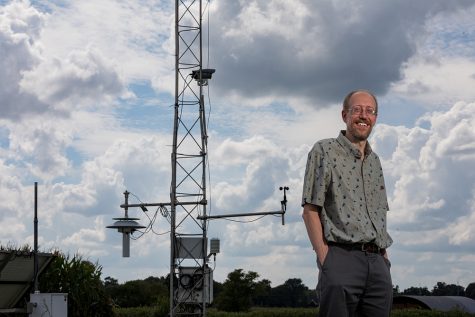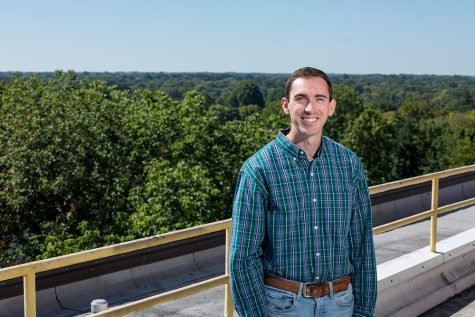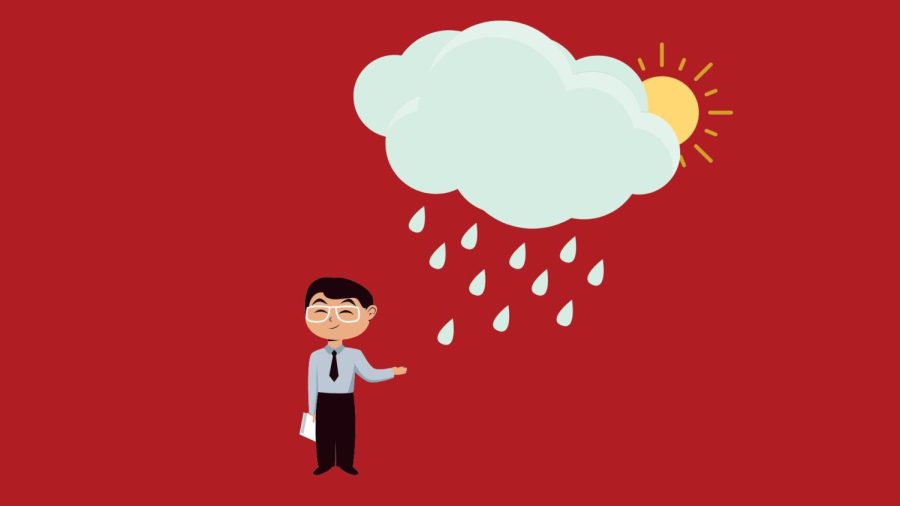‘A hub of applied learning opportunities for students’: Meteorology program adds pair of faculty
October 4, 2022
WKU’s meteorology program has added two new faculty members, bringing in mesonet expertise and a focus on teaching tangible skills.
Jerry Brotzge, a Shepherdsville native, will serve as director of the Kentucky Climate Center and Kentucky Mesonet as well as state climatologist.

Brotzge went to St. Louis University and then to the University of Oklahoma where he became familiar with weather instrumentation and worked with the Oklahoma Climate Survey and Oklahoma Mesonet. Brotzge then went to New York State University to help design and deploy a mesonet system there as well.
“The previous Kentucky State Climatologist retired last year, and so this job became open,” Brotzge said. “I thought it was a great opportunity to come back to my home state and also to WKU and continue the work my predecessors started.”
A mesonet is a high-quality network of weather stations across the country that collects weather information in a certain area every five minutes. Brotzge said all the sensors are the same across stations in order to reduce the chance for errors between sites.
Brotzge said data collected from these mesonets is archived and could be used to understand the effects of climate on different subjects. Golf courses, water treatment plants and bridges are a few places that benefit from this data.
Ironically, Brotzge received a scholarship to go to WKU, but at the time the university did not have a meteorology program.
“[WKU] is really unique, and is among one of the best undergraduate programs in the country for meteorology,” Brotzge said. “[…] It stresses hands-on experience for the students, and in today’s marketplace and in the workforce today, it’s one thing to sit in class and understand lectures, but it’s another, especially in meteorology, to apply that knowledge.”
Zachary Suriano is an assistant professor of meteorology in the Department of Earth, Environmental, and Atmospheric Sciences who plans to fulfill a mix of research objectives, teaching and giving back to the university and the community at large.
Suriano was an environmental science major as an undergraduate and received a master’s degree in geography and a PhD in climatology. He spent the last four years at the University of Nebraska in Omaha as an assistant professor before taking the position at WKU.

“The reputation of the program and the opportunities it provided for students were huge draws for me as a faculty member,” Suriano said. “Particularly the meteorology program here is known nationwide as a hub of applied learning opportunities for students, where undergraduates specifically get to engage in their research or hands-on experiential learning opportunities. The student-centered focus is really something I wanted to be a part of as a faculty member and was a big draw.”
Suriano said the partnership with the state climate office, the Kentucky Mesonet and the Kentucky Climate Center provides research opportunities for himself and students working in the lab. Thanks to these resources, they have a great deal of Kentucky-specific data.
“For me, I’m looking at this for a way to bring as many students into the research lab as possible, and provide them opportunities to ask questions about the natural world,” Suriano said. “For me, a lot of that work is looking at how we understand variations and changes in, what I call, high-impact weather: rapid snow melt, extreme rain and flooding, drought conditions, and – not that we get a lot of them – heavy snowfall events.”
Suriano’s focus is on the ability to predict high-impact weather events days, weeks or even months in advance. He hopes to impart tangible skills onto his students.
“Hopefully, [students will get] tangible skills,” Suriano said. “Yes, of course, there’s certain content we’re going to discuss, but it’s how we take that information and apply it to our daily lives. In an ‘Intro to Meteorology’ class, yes it’d be great to understand how clouds form in the atmosphere; but hopefully, the more tangible skill set that students come with is, ‘how can I look to forecast events and learn from the data and information that’s being presented to me, and impact my own decisions’.’”
News reporter Damon Stone can be reached at [email protected].
























